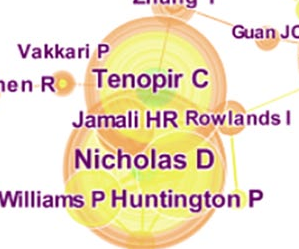.COM
2020-12-31 14:47
From 1. January 2021 our .eu domain will no longer function; please ammend any bookmarked links to ciber-research.com

2020-12-31 14:47
From 1. January 2021 our .eu domain will no longer function; please ammend any bookmarked links to ciber-research.com
2020-12-09 10:19
David Nicholas discusses the challenges facing early career researchers as a result of the pandemic and outlines how a new longitudinal, qualitative study involving 160 Early Career Researchers (ECRs) from 8 countries will seek to understand how they fare over the next two years. LSE Impact of Social Sciences blog
2020-11-26 12:44
Reasons for publishing OA: it is the ethical thing to do, easier access to content, and increased audience reach.
Reasons for refraining from OA: cost, non-availability of outlets, and concerns about reputation and recognition
Nicholas, David; Jamali, Hamid R.; Herman, Eti; Xu, Jie; Boukacem-Zeghmouri, Chérifa; Watkinson, Anthony; Rodríguez-Bravo, Blanca; Abrizah, Abdullah; Świgoń, Marzena; Polezhaeva, Tatiana (2020). “How is open access publishing going down with early career researchers? an international, multi-disciplinary study”. Profesional de la información, v. 29, n. 6, e290614. DOI:10.3145/epi.2020.nov.14
2020-11-11 13:49
The Harbingers-2 project features in the November Sloan Technology newsletter
On the becoming-virtual of meetings, classes, and academic collaborations
⭐ With Sloan support, Carol Tenopir and Suzie Allard of University of Tennessee and David Nicholas of CIBER Research will build on their 4-year longitudinal study of early career researchers in multiple countries, focusing on pandemic-related consequences on scholarly communication and collaboration practices. ciber-research.com/harbingers-2/
2020-10-16 14:14
Early career researchers and the pandemic: a study of the pandemic-wrought challenges to ECRs’ scholarly careers, communication, behaviour and attitudes. (Harbingers-2)
With funding from the Alfred P. Sloan Foundation, CIBER Research working with the University of Tennessee, will build upon the Harbingers project to establish the future of scholarship beyond these crucial and pivotal times, as seen through the lens of a new generation of professors.
Once again we will be studying the work lives, prospects and scholarly communication behaviour and attitude of today’s novice researchers. However, the new study — Harbingers-2 — will do so with the express purpose of discovering how the pandemic will affect the careers of this cohort of researchers.
2020-09-15 08:51
In recent months CIBER has been working with Cabells to better understand the continuing problems posed by predatory journals to academic publishing, specifically medical research publications. This privately commissioned research is now available in a public version:
Assessing Journal Quality and Legitimacy: An Investigation into the Experience and Views of Researchers and Intermediaries - with special reference to the Health Sector and Predatory PublishingSimon Linacre, Director of International Marketing & Development at Cabells writes of the findings and implications for scholarly communications globally—
2020-06-12 15:04
David Nicholas has been appointed a Visiting Research Academic at Oxford International Centre for Publishing. Anthony Watkinson has been appointed Research Associate in Publishing. Their role at Oxford Brookes University will be to help develop an international scholarly communications research programme.
Consequently OICP are able to supervise PhDs in a whole range of important scholarly communication topics, such as scholarly social networks, early career researchers, predatory publishing, peer review, scholarly impact, trustworthiness, authorship, scholarly journals and monographs, open access and science, scholarly reputation and metrics. If you are interested and would like to discuss this more please email David Nicholas at p0090277@brookes.ac.uk
2020-03-04 18:38

Who is who in library and information science research? The integrative application of scholarly influence indicators. Reza Mokhtarpour, Shahid Chamran. Journal of Librarianship and Information Science. 1–11 2020
2020-03-04 18:11
Predatory (deceptive? questionable?) publishing has become embedded in scholarly communication with consequent questions about the quality and validity of all journal publishing, about the use of metrics such as impact factors, and how or why authors publish in predatory journals. CIBER has embarked upon a large-scale project to look at this phenomenon. With a focus on health studies CIBER will be analysing researcher experiences and institutional support. The project is supported by Cabells — the US based scholarly analytics company and will be led by John Akeroyd.
2020-01-01 13:52
36th issue of the journal "Bulletin of TSU. Cultural studies and art criticism"
БИБЛИОТЕКА В ПРОСТРАНСТВЕ КУЛЬТУРЫ: ИСТОРИЯ И СОВРЕМЕННОСТЬ
David Nicholas The new wave of university researchers and libraries
1 Westwood Farmhouse
Greenham
Newbury
RG14 7RU
tel: +44 (0)1635 42719